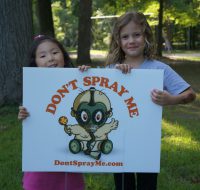By ALAN BLINDER, New York Times, SEPT. 1, 2016 [n.b. the spraying agency made several “human errors” in this case: spraying a toxic chemical other than as a last resort; not giving adequate public notice, especially to beekeepers; and spraying when bees are active during morning hours and on a hot day. If you ever observe private companies spraying airborne pesticide at times or locations where bees could be active, please document details and let us know.]
The Monday morning scene at Juanita Stanley’s apiary in Summerville, S.C., was ghastly and stunningly quiet: Everywhere one looked were clumps of honeybees, dead after a dousing on Sunday with the potent pesticide with which the local authorities had intended to kill mosquitoes.
“There was no need for a bee suit Monday morning to go down there, because there was no activity. It was silent,” Ms. Stanley said on Thursday. “Honestly, I just fell to the ground. I was crying, and I couldn’t quit crying, and I was throwing up.”
For Ms. Stanley and her business, the death toll easily exceeds two million bees, and Dorchester County officials are still tabulating how many more might have been killed when a day of aerial spraying, scheduled to combat mosquitoes that could be carrying viruses like Zika, went awry. The apparently inadvertent extermination, the county administrator said, happened after a county employee failed to notify Ms. Stanley’s business, which the administrator said should have been alerted about the spraying strategy. Some hobbyists were also caught by surprise.
“We’ve learned that the beekeeping community in Dorchester County, and in that area in particular, is larger than we were aware of,” Jason L. Ward, the county administrator, said in an interview. “Our idea is to balance working with them with the issue of public safety.”
Concerned about the spread of the Zika virus across the South, local officials on Sunday targeted a 15-square mile area of the county, which is near Charleston, with naled. The pesticide, which has been in use in the United States for more than 50 years, is a common tool for mosquito control, but federal officials have said the chemical can be harmful to honeybees while also posing brief risks to aquatic invertebrates and terrestrial wildlife….
read more at New York Times. Also see Melissa Breyer, “Massive bee death after South Carolina sprays for Zika mosquitoes, treehugger, 9/1/16, and “‘Like it’s been nuked’: Millions of bees dead after South Carolina sprays for Zika mosquitoes,” Washington Post, 9/1/16 (see also videos and photos there).
More technical: “NALED Insecticide Fact Sheet” at No Spray Coalition. A dangerous spray, no doubt about it!










